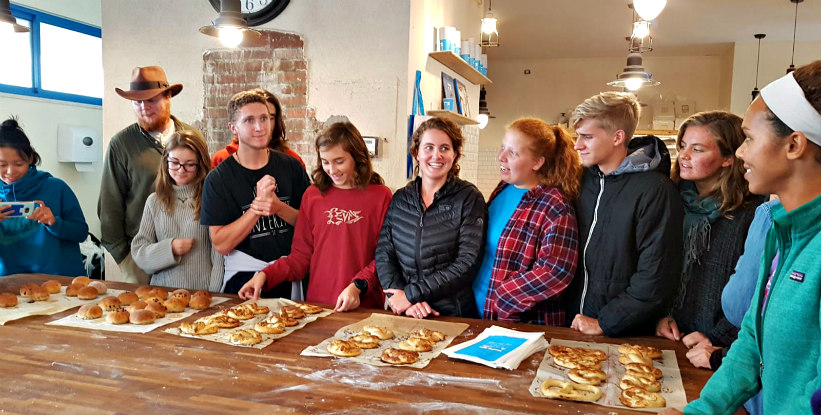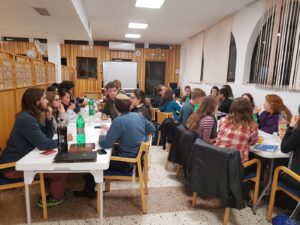For Hundreds of Christian activists arriving here to assist what they consider to be the oppressed, an effort by families in Efrat is altering their misconceptions of Israel.

Hundreds of pro-Palestinian activist groups arrive at Ben-Gurion Airport or cross into the country from Jordan over the Allenby Bridge each year. Understanding who they are and how they are indoctrinated is an important step in getting them to question the misinformation they are fed and challenge their misunderstandings of the issues here.
Israel issued a ban in October 2017 on the entrance of some 20 foreign NGOs whose activities are considered harmful to the country’s security. Despite this, hundreds of others who come to the region to demonstrate solidarity with the Arabs and who even openly declare hostility to Israel, are nevertheless allowed freedom of movement and expression by the authorities of what they claim to be a fascist state.
As founder of “iTalkIsrael,” an Israel advocacy and think tank initiative, I speak annually with some 500 foreign visitors to Israel and the Palestinian Authority. This is only the tip of the iceberg. These encounters, on the average of two to three each week, take place in my town of Efrat, a town the majority of these visitors see as situated in “occupied Palestine.”
These delegations come mostly from the United States and are usually of some Christian affiliation, though they are decidedly not Christian-Zionists. The smaller number of European groups with whom I meet are self-defined social justice or human rights organizations and tend to eschew any religious affiliation.
They come to Efrat because they are curious to visit an “illegal settlement” and to have the opportunity to meet with an “illegal settler.” Some come to gather first-hand information about settlements to assist them in their pro-Palestinian activism upon their return home. Some come to confront the settler with whom they meet, elevating this hapless individual into an unwilling spokesman for the nearly half-a-million Jews living over the 1949 Green Line. They solicit his or her response to the suffering inflicted upon the Arabs by the “Occupation.”
Their Arab hosts generally provide no context for the controversial site visits to which they bring visitors, particularly the infamous “wall” near Bethlehem. This, Israel’s highly successful, though not uncontroversial, security barrier, in combination with improved Israeli intelligence operations, is responsible for reducing to virtually zero the number of Palestinian suicide bombers who have entered Israel in recent times. Between the years 2000 – 2004 the death toll from the latter had grown to some 1,600.
The same happens with the divided “Shuhada Street” in Hebron. Until it was divided between the Jews and Arabs, Hebron’s Shuhada Street was the scene of numerous terror attacks. There is no mention by Arab spokesmen to visitors that the impetus for Israel’s many defensive measures comes from the need to defend its citizens from terrorism. Rather, in Orwellian fashion, they portray these measures as aggression while they refer to even the most grievous terrorist acts as “resistance.”
The acceptance of a flawed narrative
The adoption of the “Palestinian” narrative within many otherwise respected circles, is dependent upon people’s naiveté and their unfamiliarity with the history of the Middle-East, specifically the Arab-Israel conflict. The combination of innocence and ignorance enables “Palestinian” spokespeople to portray Israel as the powerful and malevolent Goliath and the “Palestinians” as the weak and blameless little David.
This false characterization aids Arabs and their supporters in spreading lies and half-lies, the latter often more readily accepted as they contain some element of truth. This stratagem has been particularly successful since it was first taught to the arch-terrorist leader of the PLO Yasser Arafat and his henchmen by the propaganda chiefs of Russia, Romania and North Vietnam in the early 1970’s at the height of the Cold War. PLO spokesmen were correctly taught that most audiences will never ask for evidence, since the oppressed do not lie. The carefully chosen scenes of Arab-Palestinian life that thousands of foreign visitors are continually taken to witness, lend credence to the stories they have already been told.
The ineffectiveness of lectures…
After years of speaking with people coming to Efrat, who by the time they arrive have accepted the “Palestinian” narrative, I came to acknowledge that my relatively short frontal lectures before such groups, as honest and fervent as they are, were hardly effective in altering anyone’s thinking. Spending days and nights in Arab homes, sharing meals with families, being taken to Arab refugee camps, schools and hospitals, and assisting farmers in the olive or grape harvests, are methods used by Arabs to capture people’s hearts; from that point on, virtually anything visitors are told by a “Palestinian” spokesman about the Arab-Israeli conflict is accepted as truth.
No evidence is required. The oppressed, as mentioned, do not lie.
…and the effect of experiencing life in a community
In recognition of this, several years ago iTalkIsrael developed an extended Shabbat weekend educational program. To date, this program has become successfully incorporated into the Middle-East semester abroad program of four Christian-American colleges that are based in Amman, Cairo or Istanbul, respectively. The three to four days these college student spend in Efrat is not comparable to the up to three-weeks that some of their programs dedicate to living with Arabs. Still, the Efrat experience provides some meaningful counterweight. The evidence for this is the overwhelmingly positive responses on over 500 evaluations returned by the program’s participants to date.

Spending Shabbat in Efrat with Jewish families
The first component of the program consists of touring the surrounding area and lectures by Efrat and Gush Etzion residents with expertise in a variety of fields including the Jewish religion, Jewish and Israeli history, the Israel Defense Forces, archeology and even Jewish cuisine.
However, it is the program’s unique second part, Shabbat homestays with Efrat families, that consistently elicits the highest praises from these Christian students. Efrat families do no more than open their homes to these students who enjoy their hospitality in an open and unrehearsed environment. What clearly makes the greatest positive impression upon these students is the experience of observing a traditional Shabbat, twenty-five hours exclusively devoted to prayer and religious study, family and community, and as many of the Christian students point out, sumptuous feasting in honor of the holy day.
Their visit’s high point is a free-wheeling dialogue with local English-speaking Israeli peers that takes place on Saturday night complete with all-you-can-eat pizza. The Shabbat homestay experience confirms the shared humanity of their hosts and the Efrat community and undermines the scurrilous stories they have become used to hearing about “settlers.”
Combining Emotions and Reason
Long ago the Arabs were taught that winning people’s support depends on capturing their hearts; their minds then readily follow. This is how they continue to successfully enlist and strengthen supporters who visit Israel and the Palestinian Authority. While Israelis, perhaps as a function of our cultural DNA, tend to address controversial issues more cognitively and lean heavily upon facts, the “Palestinian” narrative continues to gain adherents with its initial bid to human emotions.
The sooner Israel adapts this approach to the promotion of its message, the sooner Israel is likely to achieve greater understanding of its position amongst listeners.
____________________
Ardie Geldman lives in Efrat and is the founder and director of iTalkIsrael.
[Find this article interesting? You can find more in depth articles on Israel and the Middle East @en.mida.org.il]




Thank you for this report. I am a Christian FOR Israel and am so touched by this. Bless you always!
A very insightful understanding of human psychology.
making a bread called the heart of christian?
It is amazing how someone with half a brain has survived this long.